
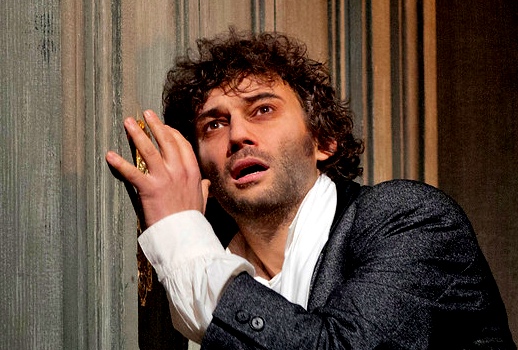
A few minutes into the first act, he wanders onstage. Disposition: sulky. Appearance: disheveled. Attire: floor length trenchcoat. He gazes at the audience for a moment, eyes filled with weary contempt. In the row behind me, three girls gasp “Oh. My. God,” and the audience follows suit by applauding deliriously.
Yet, it works. Everything Kaufmann does onstage just works, it falls into place, for one reason: his voice is truly sent from above, its fascinating timbre the embodiment of “brooding” and “sexy.” God Jonas knows that divinities don’t just give away their gifts willy-nilly. There are times in a Kaufmann performance when you swear he’s marking, and other times when you swear that he just doesn’t give a crap about anything. But then there’s that moment when he blasts the sound with a gale force, and it sweeps over the entire auditorium, and it stays there, and there’s nothing to do but react as the girls did behind me: “Oh. My. God.”
Kaufmann’s unrivaled vocal glamour lends excitement to an otherwise dreary “new production” by Richard Eyre that assumes, yet again, that the only effective dramaturgy consists of people milling about in the background preparing for cucumber sandwiches with Lord and Lady Grantham, circa 1914.
This excessive primness might be attributed to the fact that Charlotte and her family are obviously Very Proper People, and they’d naturally keep a stiff upper lip even if there’s a weird guy singing of suicide on the bench stage right. But it lends an air of implausibility to the sturm and drang of the story—if Werther is a moody poet, and he’s inspired by Charlotte to new heights (or lows) of feeling, there has to be some source of inspiration, right? Charlotte is directed to be such a priggish pill in the first two acts that it stretches credibility that anyone could be remotely aroused by her, let alone suicidally rapturous.
The second half of the opera does improve in direction, but mostly because the background fussiness is eliminated, and the singers are left to their own devices, although a last bit of director intrusion on the ending (I won’t give it away) adds a bit of shock value. There were video projections and they went like this. In the summer there were projections of leaves and birds. In the winter there were projections of snow. This is not a production that will arouse any kind of feelings, and maybe it’s better that way. I don’t know.
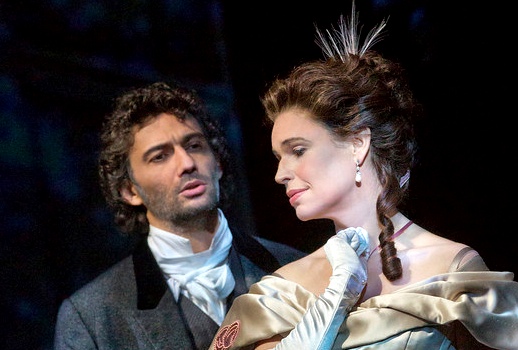
She uses her voice tastefully, with care, but it’s just not a voice one longs to hear in anything. During the Letter Scene she suffered, she wept, she raged, and I didn’t care. She adheres to what presumably is the director’s conception of Charlotte as frigid, with body language was so stiff that when Werther and Charlotte passionately clinch at the climax of their Act 3 duet, the audience laughed as she squirmed uncomfortably. In fairness to Koch, there’s a video of Werther from Paris, also with Kaufmann, in which she is warmer and more natural.
Jonas, as I said, is another matter altogether. He’s naturally introverted. Big heart-tugging displays of emotion don’t come naturally to him. And, as I said, he didn’t do much to create any sense of chemistry with Koch. But his voice carries the drama. The baritonal timbre naturally sounds moody and angsty. In Act One, as he sings to Charlotte, his voice is low-lying and sexy, the vocal equivalent of bedroom eyes. “Pourquoi me réveiller?” had the right amount of desperation, along with a huge ringing A-sharp. There are times when one wonders if he’s coasting on his good looks (those dark curls and flowing emo scarf are just perfect) and God-given voice. But if he’s coasting, the audience seems more than ready to take the ride with him.
The supporting cast were all professional. Lisette Oropesa was as usual delightful as Sophie, but she has sort of outgrown the ingenue roles, and one wishes to hear her in more substantial displays of her talent. Jonathan Summers as the Bailiff, David Bizic as Albert, sang well without grabbing the spotlight in any way. Conductor Alain Altinoglu apparently decided that Massenet’s music didn’t have enough built-in whininess so the only thing to do was stretch out the music even more just so everyone was in agony. A rather short opera therefore gave the impression of being an endless dirge.
In the end, does it matter though? There’s one reason to go see this Werther: Jonas “Oh. My. God.” Kaufmann.
Photos: Ken Howard/Metropolitan Opera















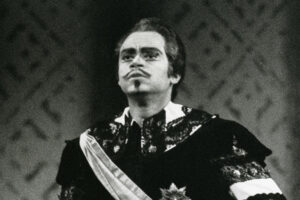
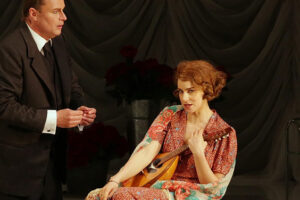
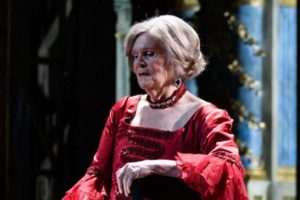






Comments